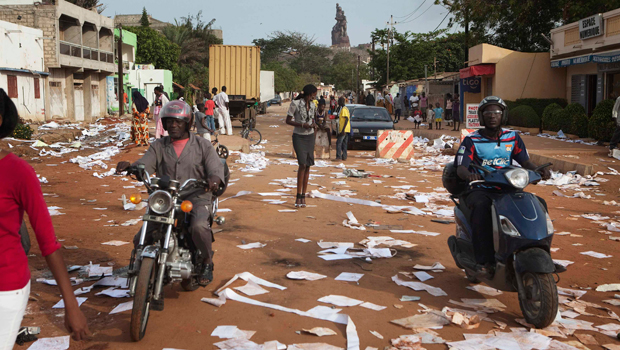Many Dakar homes and businesses have been without electricity for more than 30 hours, catalizing anti-government sentiment in the normally tranquil West African state.
Overnight, demonstrators burnt tires, blocked roads and ransacked the offices of state utility Senelec and ministers’ homes, leaving debris strewn in the streets.
The riots followed anti-government protests last week after President Abdoulaye Wade tried to alter the constitution in a way his rivals said would make it easier for him to get re-elected in February polls.
“We’re fed up with these blackouts, which create big problems in our lives on a daily basis,” said Yancouba Diatta, a teacher. “We had great hopes for Wade when he came to power ten years ago. But he has not been able to fix Senegal’s problems and we want him to leave.”
On Tuesday morning, truckloads of gendarmes in full riot gear moved through Dakar’s streets, and a helicopter gunship flew low near the city’s African Renaissance monument, a controversial $27 million statue of a man, woman and child built by Wade in 2009. No clashes were reported.
Senegal has earned a reputation as West Africa’s most stable and democratic country but is seeing rising public frustration over backsliding public services, particularly in power generation, since Wade took power in 2000.
Standard Bank emerging markets analyst Samir Gadio said the growing social unrest in the country, one of a handful of sub-Saharan nations with a eurobond, may rattle investors leading into the February 2012 election.
But he added that “the country’s institutional credentials and relative track record of stability over the past decades will probably be taken into account in any investment decision process.” Senegal’s Eurobond yield was up 4 basis points at 8.215 percent and the price was down 1/4 point at 104.5 by 1400 GMT.
Years of poor management and low investment have left the West African state with one of the world’s most inefficient power sectors, based largely on diesel generators that the cash-strapped state utility struggles to refuel.
Ashley Elliot at London-based Control Risks said he expected more protests over blackouts but that they were unlikely to reach the fever-pitch of Arab world revolutions.
“On balance I don’t think popular regime change is around the corner,” Elliot said. “The government has not so far used lethal force. If protests escalate and the military steps in with live rounds, we could see bloodshed and an immediate drop in support for Wade both within the PDS (ruling party) and among the large Sufi (religious) groups,” he said.
Elliot said Wade could hold on for some time, but weakened by the rejection of his unpopular constitutional reform, he will be unable to engineer the succession of his unpopular son, Karim, who is also a “super minister” in the government in charge of many portfolios including the energy ministry.
State utility Senelec has been unable to keep up with electricity demand for years and a source at the company said it was currently facing a “huge shortage of fuel.”
Senelec director Seydina Kane, flanked by two ministers, said on national television on Tuesday that the blackouts had been caused by fuel shortages and the company was working to get the situation back to normal by the end of the year.










